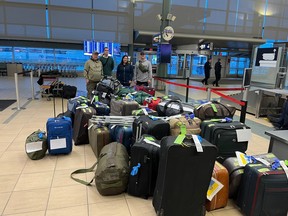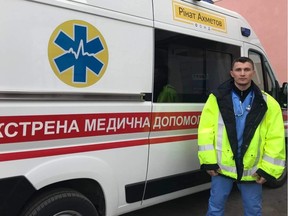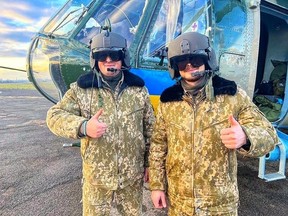The third Battle of the Sheepdogs between community standards officers like Bob Baker and Daniel Laskavenko goes March 25 at the West Edmonton Mall Ice Palace. It’ll be the first in a couple of years due to the pandemic and the first to focus not on folks experiencing homelessness in the City of Champions, but soldiers and civilians defending their homeland against Russian invaders.
“Me personally, it makes you think what war can do, and if you had to deal with that personally, obviously it would be pretty rough circumstances,” he said. “It’s been pretty motivational and pretty cool to see the efforts going on.”

Laskavenko’s parents left Ukraine in the early 1990s. He was born in Canada and still has family members there, in places less affected by the fighting. The ETS community standards officer has been collecting donations of used or slightly expired supplies and equipment and brought his first haul of 47 suitcases and hockey bags of the stuff to the war-ravaged nation in December. He started a charity with a GoFundMe page as well, the Ukrainians of Canada Foundation, or UCAN.
The trio of Laskavenko, Shannon Boddez, a nurse at Royal Alexandra Hospital, and business owner Dave Bryenton brought over military-grade First Aid kits, warm underlayers, and as many drones and pairs of boots they can get their hands on.
“We try to bring as many of those (drones) as we can because they’re immediately put to use, either for recon or they’ll use them in battle, they’ll put a little cradle on them for a couple of grenades.”
He said even basics like Advil and cough syrup have been well-received on the front lines, as have a “large” donation of high-visibility clothing from the Town of Jasper.

Once the donations get to Ukraine, they’re distributed to hospitals, first responders, soldiers on the front lines and others, sometimes in a large lot, sometimes with just one person showing up to pick up a single bag.
They start in Lviv, the major city near Ukraine’s western border, where they brought medical supplies, some lightly expired, to a hospital.
But wait, there’s more
Actually, the giving started sooner than that. Cash and in-kind contributions play an important role in the logistics of charity. Air Canada earned some kudos from Luskavenko and his crew for waiving the luggage fees for the 47 bags they brought, saving them in the order of $10,000. Or, in battlefield terms, enough to buy one unarmored vehicle.
“A light Jeep for guys to get around, going between two positions, it helps a lot,” he said. “The cars there, they don’t last very long.”
Other institutions along the way tend to get involved. The hotel they stayed at in Warsaw, for example, provided room for them to store the goods overnight.
Far from the front line in the east, that city is well-supplied. Luskavenko, a fluent Ukrainian speaker, said life seems to go on almost as normal in places where there is no active combat.
Bakhmut appears to be where the need is greatest, along with other places in eastern and southern Ukraine.
“They need tourniquets like crazy (in Bakhmut),” Luskavenko said. “We try to distribute everywhere — we try to get to places where they don’t normally get help. It’s harder to get (goods in) even Kyiv, Kherson, Dnipro, (places) freshly liberated.
“People are adapting to a minimalist lifestyle. The constant hum of generators running outside businesses is in the air all the time. People are just trying to get through it. It’s a level of patriotism and togetherness I’ve never seen. It’s the similarity. That could be us.”
@yegcraig





